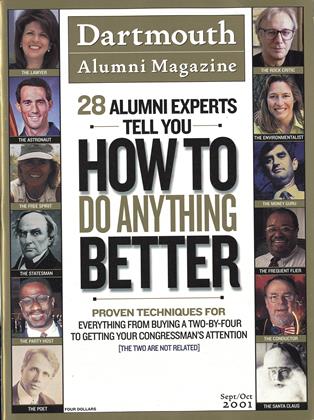BE A TECHIE. You need a technical degree: math, material sciences, chemistry, physics, medicine. No lawyers, no M.B.A.s. Physics is a good background, since it helps you in the process of learning to solve problems. In physics, and in space, you're often working in areas that haven't been worked in before.
GET USED TO DEALING WITH RISK. Going into space is both expensive and dangerous. You can't actually practice being there. The first time you do it, you do it for real. On Endeavourwe had a payload-release malfunction in which shrapnel penetrated the aft bulkhead. Fortunately NASA is very thorough in its training. You learn the process so that even if something happens that isn't expected, you've seen something like it or know what book to look in.
LEARN TO TOLERATE BODILY WEIRDNESS. You don't want to be claustrophobic. And 70 percent of astronauts get space adaptation syndrome, which is like being seasick. Your tastes also change while you're up there; I don't like cooked vegetables for the first week in space. And most people get space legs after a while. You learn not to go too fast, and not to kick with your feet. Your feet are not of much use in space. You also experience 3Gs during liftoff. It feels like two of your best buddies jumped on your chest.
BE NICE. Astronauts are typically personable, in addition to being well-accomplished. They shouldn't need to put on airs.
GET LUCKY. From up to 5,000 astronaut applicants each year, NASA picks 120 to interview, 60 civilian and 60 military. Of those, NASA picks 15 to 30 as finalists. NASA likes to pick people in their early- to late-30s. I interviewed four times in six years before I made the cut in 1990. One of the guys on the selection committee came back to us later and said, "If any of you don't think that luck played an important part in your selection, think again." Truth be told, most of those 120 candidates are perfectly qualified to do the job.
Newman shows he has the right stuff
Newman is a space shuttle mission specialist. Hehas flown on three shuttle missions and loggeddays in space. In January he'll embark on his nextmission, to refurbish the Hubble Telescope. A resident of Houston, Newman majored in physics.
 View Full Issue
View Full Issue
More From This Issue
-
 Cover Story
Cover StoryHOW TO MAKE AN AWARD-WINNING DESSERT
September | October 2001 By ERIKA SIMEON '92 -
 Cover Story
Cover StoryHOW TO WIN AN EASY BUCK WITH A CARD TRICK
September | October 2001 By MICHAEL ELLIS '39 -
 Cover Story
Cover StoryHOW TO STOP HATING CLASSICAL MUSIC
September | October 2001 By ERICH KUNZEL JR. '57 -
 Cover Story
Cover StoryHOW TO CHOOSE A LAWYER
September | October 2001 By BARBARA MURPHY '79 -
 Cover Story
Cover StoryHOW TO QUIT YOUR JOB AND HIT THE OPEN ROAD (IN A MOTOR HOME)
September | October 2001 By MARIANNE McCARROLL 84 -
 Cover Story
Cover StoryHow to Find Your Inner Santa
September | October 2001 By ARTHUR H. RUGGLES JR. ’37
Features
-
 Feature
FeatureFaculty Portfolio
MARCH 1967 -
 Feature
FeatureThe Way it Was
JUNE 1983 By COMMENCEMENT '83 -
 Feature
FeatureHORNING: Invention of the Devil
DECEMBER 1963 By HAROLD BRAMAN '21 -
 Feature
FeatureThe Fifty-Year Address
July 1957 By JAMES M. O'NEILL '07 -
 Feature
FeatureThe Dartmouth Animal and The Hypermasculine Myth
September 1980 By Leonard L. Glass -
 Feature
FeatureTrip to the sea
June 1993 By Will Lange

